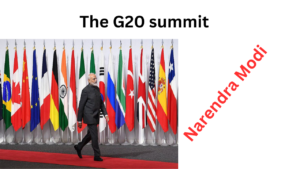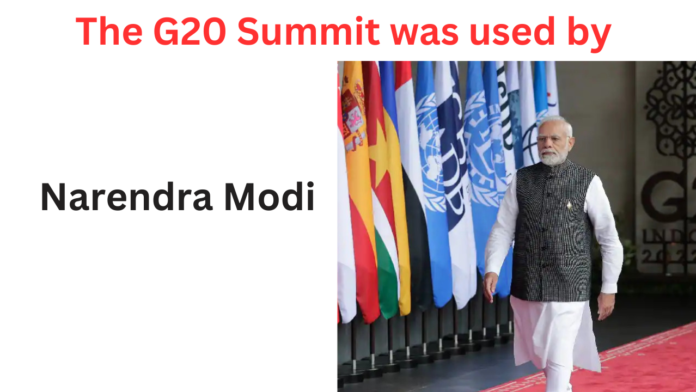The G20, sometimes known as the “Group of Twenty,” is an association of the twenty most significant economies in the world. It was founded in 1999 in the wake of the “Asian Financial Crisis.”
The finance ministers and central bank governors of these 20 nations were the only members of this alliance at first.
Governments or heads of state from these nations later stepped forward to serve as the alliance’s public face, and since 2009, G20 summit meetings have been held in a variety of locations, including Washington, DC, London, Pittsburgh, Hangzhou, Toronto, Brisbane, and Antalya.
The G20 summit is now taking place in Delhi because India is the alliance’s current chair.
All the major international leaders are currently present in Delhi to take part in the alliance’s conference, with the exception of Russian President Vladimir Putin and Chinese President Xi Jinping, who sent their delegates instead of travelling themselves.
It is unheard of how Delhi has been decked for the summit and how enthusiastic India is about the G20.
All observers concur that a number of nations have held the office of G20 “presidency” or “rotating presidency” in the past, but none have utilised it as expertly as India has on this particular occasion.
On the one hand, India has made a name for itself as a leading voice in the developing world, or the “Global South.”
Prime Minister Narendra Modi wants to emphasise, however, that India’s significance and status on the international scene have changed.
Political observers think Narendra Modi might benefit from this issue in the upcoming general elections.
Overall, it is unlikely that another government will use the G20 presidency in the way that India’s Narendra Modi administration has.

The Modi administration started portraying India as a “world guru” or a model for international leaders in the middle of his second term.
When India started exporting the COVID vaccination to other nations after starting its manufacture there, this word came into circulation.
India would serve as a consultant to and advisor to international leaders, as the phrase “world guru” suggested.
The term “world guru” acquired a new meaning in the nation last November, when India assumed the chairmanship of the alliance in Jakarta following the G20 conference.
Large G20 posters and banners have been erected in several Indian cities since the year’s conclusion, showcasing not only images of world leaders but also the smiling face of Prime Minister Narendra Modi.
Narendra Modi has invited international leaders to Delhi, and there has been a lot of media coverage about their coming together on one stage.
In the words of Rajesh Chaturvedi, a political analyst in Delhi, “Narendra Modi and ‘world guru’ have become one since then!”
The government has been attempting over the past year to demonstrate that Modi is a global guru. According to Chaturvedi, a lot of people have believed it.
This choice has significantly contributed to the dissemination of this notion across the nation because G20 meetings were conducted in various locations around India during the year.
Srinagar, the capital of Indian-administrated Kashmir, also hosted a G20 tourism group meeting, which India used to demonstrate to the world that Kashmir is no longer a contentious area but rather a crucial component of India.
The broad public now agrees that Narendra Modi’s leadership has considerably increased India’s prominence and status on the world stage.
This claim was supported by a recent survey conducted by the American research firm Pew Research, which found that 68% of Indians now think that their country’s standing in the world has greatly improved.
Many think that this sense of well-being and nationalist pride among the populace could work in Narendra Modi and the BJP’s favour in the 2019 general elections.
This week, the international publication “The Economist” published an article headlined “India’s Spectacular Success” about India hosting the G20 Summit. In essence, they are praising India’s outstanding accomplishment!
They claimed that since achieving independence in 1947, India has mostly concentrated its foreign policy on the globe’s weaker countries, also known as the “third world.” However, India now wants to establish itself as the leader among the least developed nations, and the G20 presidency has been very helpful in achieving this goal.
In reality, Prime Minister Narendra Modi spoke at the “Global South” meeting earlier this year, which was held in India and attended by about 100 such nations.
According to “The Economist,” India might become a key voice in the Global South following the G20 Summit. Due to Delhi’s decision to recognise the African Union as a new member of the G20 at the summit, which increased India’s influence on that continent, this is particularly noteworthy.
The G20 Summit is “a big opportunity for Modi!” according to CNN. They view it as an occasion for India to become a “modern superpower.” A key factor will be the accomplishment of the Chandrayaan-3 mission earlier this year and the hosting of a sizable international gathering afterward.
This year, India surpassed China as the world’s most populous nation. In addition, India now has the greatest growth rate among the world’s major economies.
The time was right for India to assume the G20 leadership, and many observers agree that it was a wise choice.
The achievement of a “united declaration” among all participating nations was likely the largest difficulty when it came to India hosting the G20 Summit. Last year, consensus had been difficult to come by due to disputes on a variety of topics, including the Ukraine crisis and climate change, in numerous working group meetings.
A “compromise document” that explained where consensus was established and where differences persisted was published following the majority of these meetings.
But this evening (Saturday), a “hundred percent consensus” was declared from Delhi’s “India Mandapam,” demonstrating that India had overcome the challenging challenge of forging consensus.
According to Professor Harsh V Pant, Senior Fellow at the Observer Research Foundation in Delhi, “The fault lines in global politics are now so clear that if a united declaration couldn’t be issued in Delhi, India wouldn’t have been blamed.”
They still want to characterise this as a “major diplomatic success” in which India was able to pull nations like Russia, China, the United States, or Britain closer together through a single proclamation.
The Takshashila Institute’s well-known think-tanker Kajari Kamal concurs that the G20 Summit demonstrated India’s dedication to forging international agreement on a worldwide scale. She stated, “I think India’s biggest achievement from this summit is their ability to bridge the gap between the East and the West or the North and the South.”
In order to make the G20 Summit a turning point in India’s history, Narendra Modi has done everything possible. It will now be interesting to observe where this summit places him in the history of the nation.
More blog post here:https://www.myanmarpyitharnews.com/




























